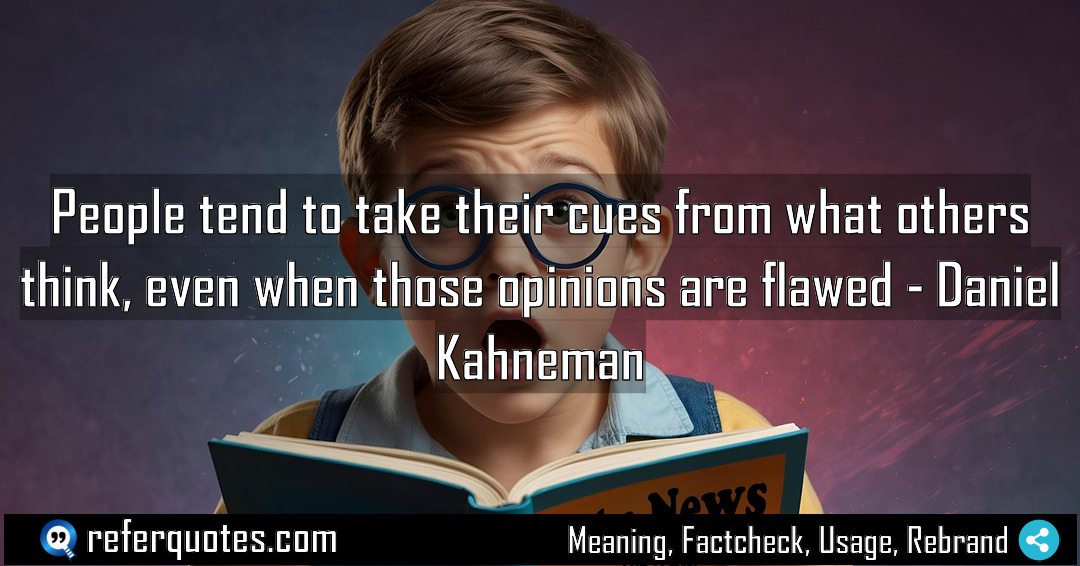People tend to take their cues from what others think… and Kahneman nails why this is such a massive blind spot in our thinking. It’s not just about following the crowd; it’s a deep-seated mental shortcut that can lead even smart people astray. Let’s break down why this happens and how to spot it.
Share Image Quote:Table of Contents
Meaning
At its core, this quote is about social proof—our brain’s tendency to outsource difficult thinking to the group, trusting the collective opinion even when it’s wrong.
Explanation
Okay, so here’s the thing I see all the time. We’re wired for efficiency, right? Your brain is looking for any shortcut it can find. And one of the easiest shortcuts is to just look around and see what other people are doing, what they’re thinking. It’s a low-energy way to navigate the world.
The problem, and this is Kahneman’s real genius, is that this mechanism is completely indifferent to quality. It doesn’t care if the opinion is brilliant or utterly flawed. If enough people seem to believe it, your fast-thinking system just goes, “Welp, that’s good enough for me,” and you adopt it as your own. It’s why bad ideas can gain so much traction and why bubbles—both financial and cultural—happen. We’re not just following the crowd; we’re outsourcing our judgment to it.
Quote Summary
| Context | Attributes |
|---|---|
| Original Language | English (3668) |
| Category | Relationship (329) |
| Topics | bias (25), conformity (2) |
| Literary Style | analytical (121) |
| Emotion / Mood | realistic (354) |
| Overall Quote Score | 79 (243) |
Origin & Factcheck
This insight comes straight from Daniel Kahneman’s 2011 masterpiece, Thinking, Fast and Slow. It’s a cornerstone of his work on cognitive biases. You sometimes see similar ideas misattributed to other behavioral economists, but this specific framing of using social cues as a mental shortcut is pure Kahneman, rooted in decades of research with Amos Tversky.
Attribution Summary
| Context | Attributes |
|---|---|
| Author | Daniel Kahneman (54) |
| Source Type | Book (4032) |
| Source/Book Name | Thinking, Fast and Slow (54) |
| Origin Timeperiod | 21st Century (1892) |
| Original Language | English (3668) |
| Authenticity | Verified (4032) |
Author Bio
Dr Daniel Kahneman transformed how we think about thinking. Trained in Israel and at UC Berkeley, he built a career spanning Hebrew University, UBC, UC Berkeley, and Princeton. His partnership with Amos Tversky produced prospect theory and the heuristics-and-biases program, culminating in the Nobel Prize in Economic Sciences. He engaged broad audiences through bestselling books and practical frameworks for better decisions. He continued writing and advising late into life, leaving ideas that shape economics, policy, medicine, and management. If you want to dive deeper, start with the Dr Daniel Kahneman book list and explore his enduring insights.
| Official Website
Where is this quotation located?
| Quotation | People tend to take their cues from what others think, even when those opinions are flawed |
| Book Details | Publication Year: 2011; ISBN: 9780374275631; Latest Edition: Farrar, Straus and Giroux, 2013; Number of pages: 499. |
| Where is it? | Part II: Heuristics and Biases, Chapter 15: Linda: Less is More, Approximate page 240 (2013 edition) |
